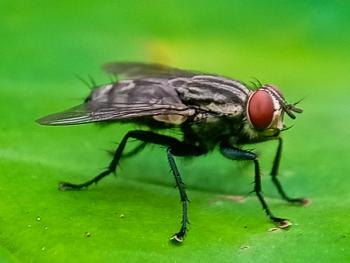
Powerful protection against a wide range of internal parasites (Sponsored by Virbac Animal Health)
You can reduce infection rates by formulating a comprehensive parasite prevention program for your patients, a strategy recommended by the Companion Animal Parasite Council (CAPC), American Association of Veterinary Parasitologists, and Centers for Disease Control and Prevention.
The problem
Parasites such as roundworms, tapeworms, and hookworms can cause serious disease —and even death—in dogs and can also infect people. Infection can occur in many ways, and pets may not show clinical signs until it is too late. So how can you provide complete protection?
The strategy
You can reduce infection rates by formulating a comprehensive parasite prevention program for your patients, a strategy recommended by the Companion Animal Parasite Council (CAPC), American Association of Veterinary Parasitologists, and Centers for Disease Control and Prevention.1,2
- Puppies: Routinely deworm beginning at 2 weeks old and repeat every two weeks until the animals are 8 weeks old and are placed on a monthly parasite control product.
- Nursing dams: Deworm concurrently with their offspring because dams often develop patent infections.
- Adult dogs: Administer broad-spectrum heartworm anthelmintics that have activity against zoonotic parasites, and use them year-round.
- Newly acquired pets: Deworm immediately and repeat in two weeks.
"Treatment to eliminate intestinal parasites prevents primary disease in pets," says Byron Blagburn, MS, PhD, professor of parasitology at Auburn University's College of Veterinary Medicine. "It also eliminates the shedding of even small numbers of fecal stages. For people, the zoonotic risk is exposure to soil or another substrata that contains infected eggs or larvae."
In addition to recommending year-round prevention, the CAPC guidelines state that veterinarians should tailor these preventive programs to the needs of individual patients. "The importance of effective parasite control is amplified in hyperendemic areas," Dr. Blagburn says. Thus, if you live in an area where exposure to various worms is high, you should conduct fecal examinations more frequently and deworm your canine patients appropriately.
The product
Virbac currently offers veterinarians and their clients the monthly preventive IVERHART MAX®—the parasite prevention product with the broadest spectrum on the market.* Now, Virbac introduces Virbantel™ (pyrantel pamoate and praziquantel)—flavored, chewable deworming tablets for dogs for the treatment and control of roundworms, hookworms, and tapeworms. Virbantel is approved for dogs 12 weeks of age or older, and safety in breeding and pregnant bitches has not been tested.
"Virbantel fits nicely into a strategic approach to parasite control," Dr. Blagburn says. "If broad-spectrum preventive agents are not used, then timely administration of strategic dewormers , such as Virbantel, could be used. Virbantel can also fill gaps left by broadspectrum agents that do not eliminate certain parasites, such as tapeworms."
To monitor the efficacy of the deworming and client compliance with monthly preventives, you should perform a fecal examination two to four times in a puppy's first year and one to two times per year in adults. All dogs should be tested for heartworm infection before starting a preventive program. Following the use of IVERHART MAX, digestive and neurologic side effects have rarely been reported. Use with caution in sick, debilitated, or underweight animals and dogs weighing less than 10 lbs.
References
1. Companion Animal Parasite Council. CAPC Guidelines. Available at:
2. CDC Division of Parasitic Diseases. Guidelines for veterinarians: prevention of zoonotic transmission of ascarids and hookworms in dogs and cats. Available at:
Further reading
Log on to
*Please consult package insert for complete IVERHART MAX product information. Indications: For use in dogs to prevent canine heartworm disease by eliminating the tissue stage of heartworm larvae (Dirofi laria immitis) for a month (30 days) after infection and for the treatment and control of roundworms (Toxocara canis, Toxascaris leonina ), hookworms (Ancylostoma caninum, Uncinaria stenocephala, Ancylostoma braziliense), and tapeworms (Dipylidium caninum, Taenia pisiformis).
Intestinal parasites
Virbantel treats and controls the following intestinal parasites:
Roundworms
- Toxocara canis is one of the most common canine parasites in the United States.
- A recent CDC serologic study* suggests that about 14% of the U.S. population has been exposed to eggs of Toxocara, a common parasite of dogs and cats.
- Roundworms are transmitted to dogs or cats by ingestion of embryonated eggs or paratenic hosts or transplacental or transmammary larval migration.
Hookworms
- Ancylostoma caninum is common throughout the United States.
- Larvae can cause cutaneous larval migrans in people.
- Hookworms are transmitted by ingestion of eggs, skin penetration, ingestion of paratenic host, or transmammary migration.
Tapeworms
- Tapeworms are common intestinal parasites found throughout the United States.
- Occasional reports exist of Dipylidium caninum infections in children following the ingestion of an infected flea.
- Tapeworms are transmitted to dogs by ingestion of infected fleas, rabbits, or small rodents.
Clients should consult their veterinarian for assistance in the diagnosis, treatment, and control of parasitism.
*Source: CDC Division of Parasitic Diseases. New CDC study results show Toxocara infection more common than previously thought. Available at:
Sponsored by Virbac Animal Health.
©2008 Virbac Animal Health. All rights reserved.
Newsletter
From exam room tips to practice management insights, get trusted veterinary news delivered straight to your inbox—subscribe to dvm360.






